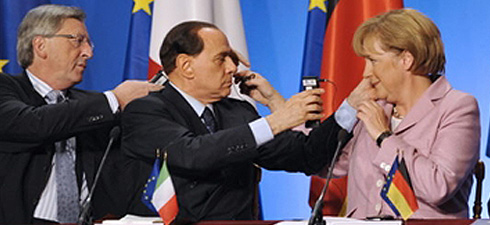"Only in Romania" is one of those annoying expressions, often used to justify "the Romanian exception" — a lack of initiative and general indifference to politics. But on occasion, it may have an opposite meaning, and hint at a national superiority complex.
Recently, the infestation of the media with "Only in Romanias" has reached an all time high in articles that compare our venerable state to other members of the European Union. In a spate of national breast beating, the press is eager to inform us that we have the worst record for abusing EU funds, and that our politicians are chronically immature hillbillies, who are quite simply incapable of meeting modern democratic standards. Some of the most recent examples of this genre of self-indictment focus on EU sanctions against Romania for failing to meet its commitments on energy use. However, anyone who took the trouble to conduct minimal research would quickly realize that notice of sanctions for an unreasonable delay in the application of the EU directive in question was issued to 25 of the EU's 27 member states.
While we are on the subject of the poor quality of Romania's politicians, let's have a quick look at the competition in neighboring countries. For political vision, look no further than the Czech Republic, where voters were astute enough to elect a eurosceptic president who has banned the EU flag on public buildings and announced that "the Czech Republic is not a province of the European Union." He also dismissed the national government just when the Czech Republic was about to take over the EU presidency — and in so doing, offered abundant ammunition to the opponents of enlargement in long-standing EU member states who insist that it was a mistake to join forces with Eastern Europeans, who "lack the requisite political maturity."
Unfortunately, the countries of Western Europe do not always a set a glowing example: a case in point is the spectacular behaviour of Italy's most illustrious Berlusconi. In 2008, the Barroso Commission organized a discreet reshuffle. In the wake of general elections in Italy, the then Commissioner for Justice Franco Frattini was recalled to take on the role of Italian Foreign Minister, and his duties were temporarily assigned to Barrot the French Commissioner for transport. Thereafter, Barot continued at the post of commissioner for Justice, while the next Italian to be appointed took over his mandate for transport. The swap rewarded Nicolas Sarkozy with a greater role for France in the functioning of the Union, and at the same time, the Commission avoided the potential embarrassment of having a Commissioner for Justice appointed by the Berlusconi administration.
In the same vein, there is something not quite kosher about Gerhard Schröder’s situation. As German Chancellor, he negotiated the details of his country’s cooperation with the energy giant Gazprom. Now that Angela Merkel has replaced him, he is associated (albeit indirectly) with the same Russian conglomerate. Is that ethical?
To return to the thorny question of "the poor quality of Romanian politicians." I have to say that I do not share in "Romania’s shame" at having elected "the notorious duo" of Corneliu Vadim Tudor and Gigi Becali to the European Parliament in June. Brussels now has vibrant population of saboteurs, who aim to throw a spanner in the works of Europe’s democratic institutions. You might even say that it is healthy for parliament to include representatives of all political views, no matter how mulish, in as much as it helps to divert extremists away from violence.
As to the question of comparisons between different member states, we should bear in mind the essential wisdom of the farmer who announced that poor health of his neighbour’s goat had nothing to do with the fact that two of his own were limping. The sorry state of the judicial system in Italy in no way excuses any inadequacy of the courts in Romania. Germany’s lack of a law on transparency should not be interpreted as an authorization for complacency elsewhere. However, a good knowledge of the political shortcomings of neighbouring countries is useful in as much as it helps us to address critical issues in a more timely manner. As the Romanian proverb puts it, fools learn from their own mistakes, but it is a wise man that learns from the mistakes of others.
Was this article useful? If so we are delighted!
It is freely available because we believe that the right to free and independent information is essential for democracy. But this right is not guaranteed forever, and independence comes at a cost. We need your support in order to continue publishing independent, multilingual news for all Europeans.
Discover our subscription offers and their exclusive benefits and become a member of our community now!












